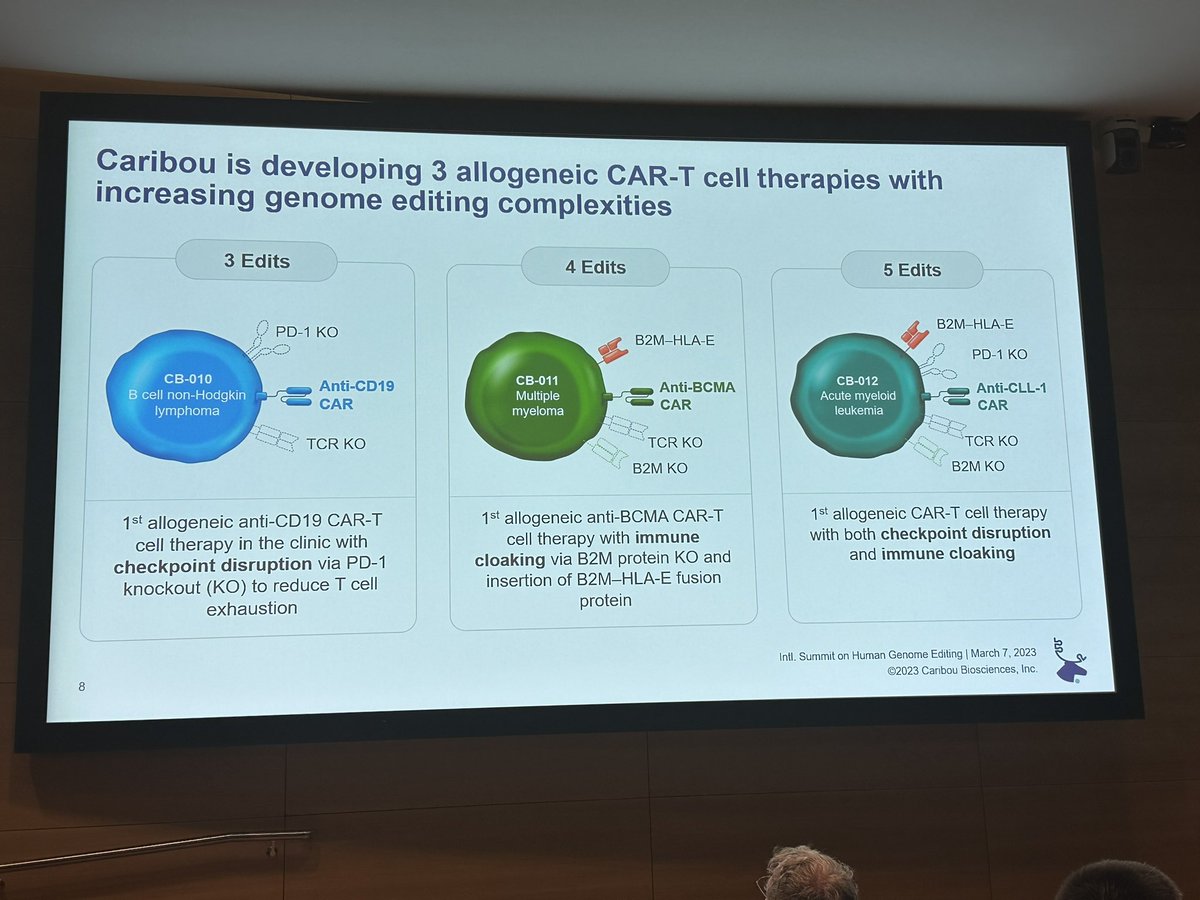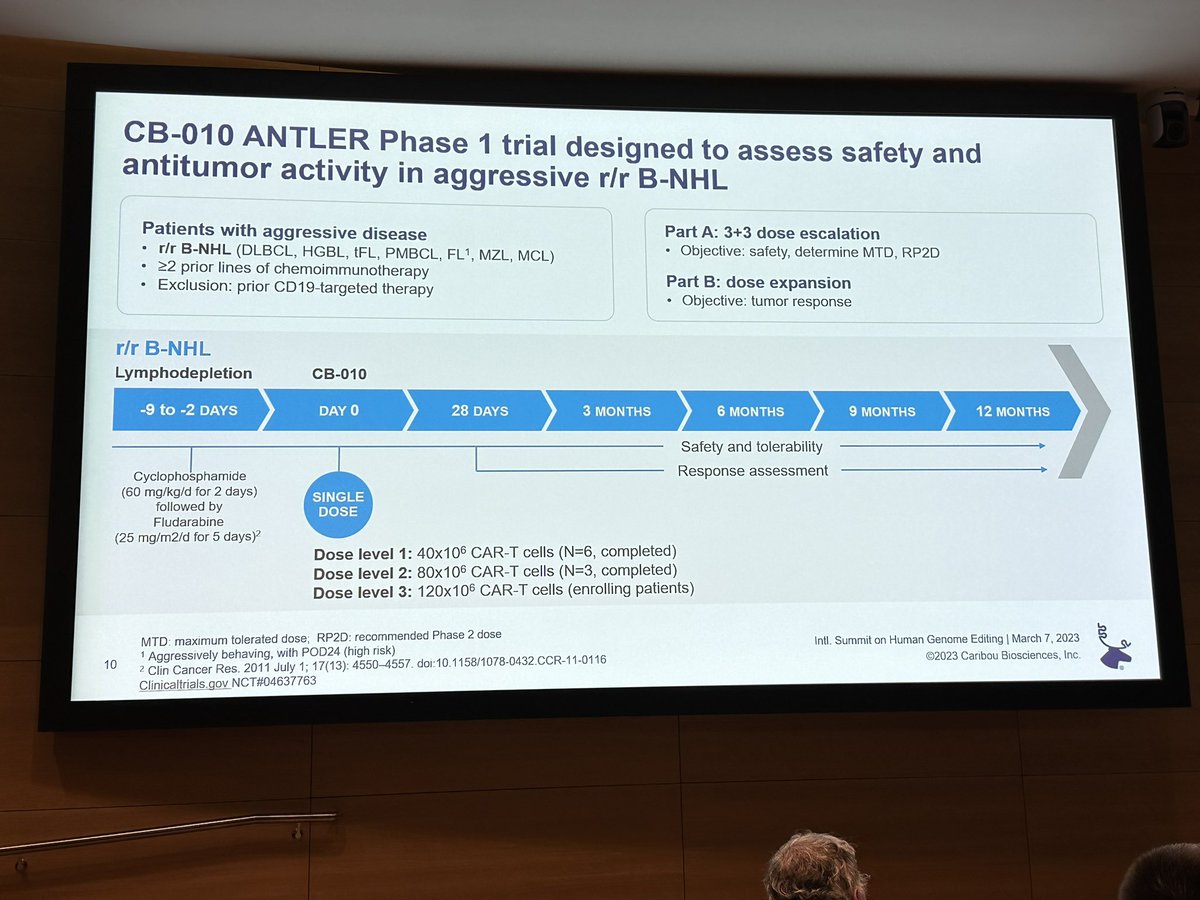
Day 2 at #HGESummit at @TheCrick. It will be another full day
@TheCrick Patient groups were much more active around gene editing five, six years ago, says @MBoudes. Says he does not know why. "I hope to find the answer from the discussion with my fellow speakers and also from the audience." #HGESummit
@TheCrick @MBoudes "The reason I ended up in patient advocacy and sitting here is unfortunately a very personal one", says @BettinaRyll. She was working as a scientist when her husband was diagnosed with melanoma. "we were told ... I'm sorry, it is cancer. And there is nothing we can do for you."
@TheCrick @MBoudes @BettinaRyll Her husband was in his 30s then. "He was dead less than a year later", says @BettinaRyll. In that time, he was in a phase three clinical study, a phase two trial and an early access programme in between, she says. That experience started her on patient advocacy.
@TheCrick @MBoudes @BettinaRyll One revelation was reading up on research when her husband's cancer became resistant to one drug. "I was shocked to realise that a lot of the research I could read would not be holding up to anything that my PhD supervisor would have considered an appropriate model system."
@TheCrick @MBoudes @BettinaRyll "I think many researchers get up in the morning because they want to make a difference. This is what drives people", says @BettinaRyll. But research environment and clinical environment are deeply separated in many countries, she says, making translation hard.
@TheCrick @MBoudes @BettinaRyll Ryll also criticises the original title of the session "the role of non-scientists in research agenda". "Many people who are actually involved in this debate are scientifically trained. And by the way, you are a part of civil society too. So civil society is all of us."
@TheCrick @MBoudes @BettinaRyll In 2015 @lexikon1 covered gene editing for Vice Magazine as a journalist. "That's when I watched Barbara Evans talk about the regulatory morass surrounding genome editing and I was so inspired by her that I decided to embark on graduate work in bioethics."
@TheCrick @MBoudes @BettinaRyll @lexikon1 Her work focuses on "non-establishment research": "science that takes place outside of traditional research outside industry and in which practitioners do research in homes or community laboratories, often collaborating online with colleagues across global borders"
@TheCrick @MBoudes @BettinaRyll @lexikon1 "What you see in the media is not representative of a movement that is truly global is 1000s of people large and it has representation across the global South as well as the US and Europe and is serious about delivering accessible innovative bio technologies", says @lexikon1
@TheCrick @MBoudes @BettinaRyll @lexikon1 "We should be asking ourselves, what if one of these groups has a major breakthrough? It's not at all clear if FDA regulations apply to non-commercial research", says @lexikon1. #HGESummit
@TheCrick @MBoudes @BettinaRyll @lexikon1 It's smart for patient advocacy groups to talk to research funders says @BettinaRyll. "If you want to herd cats, you move the food." #HGESummit
@TheCrick @MBoudes @BettinaRyll @lexikon1 Q about accountability in DIYbio space gets some pushback: "It's pretty clear that accountability isn't really maintained in the formal institutional space either" says Maui Hudson. #HGESummit
Amy Wagers talking about an interesting strategy to treat Duchenne muscular dystrophy: Excising a piece from the dmd gene that leads to a larger deletion but rescues the reading frame. So instead of a complete loss of dystrophin protein you get a shortened version. 

Many issues of course including toxicity. That comes in part from difficulty in targeting skeletal muscle. „Rhe real game changer for us has been the availability of new more muscle-targeted AAV capsid variants“, says Wagers. 

„Most gene therapies and most gene editing strategies have really focused in on single genes and the need to modify them in single organ systems. But there's a whole host of other disorders where that simple approach will not be effective“, says Wagers 
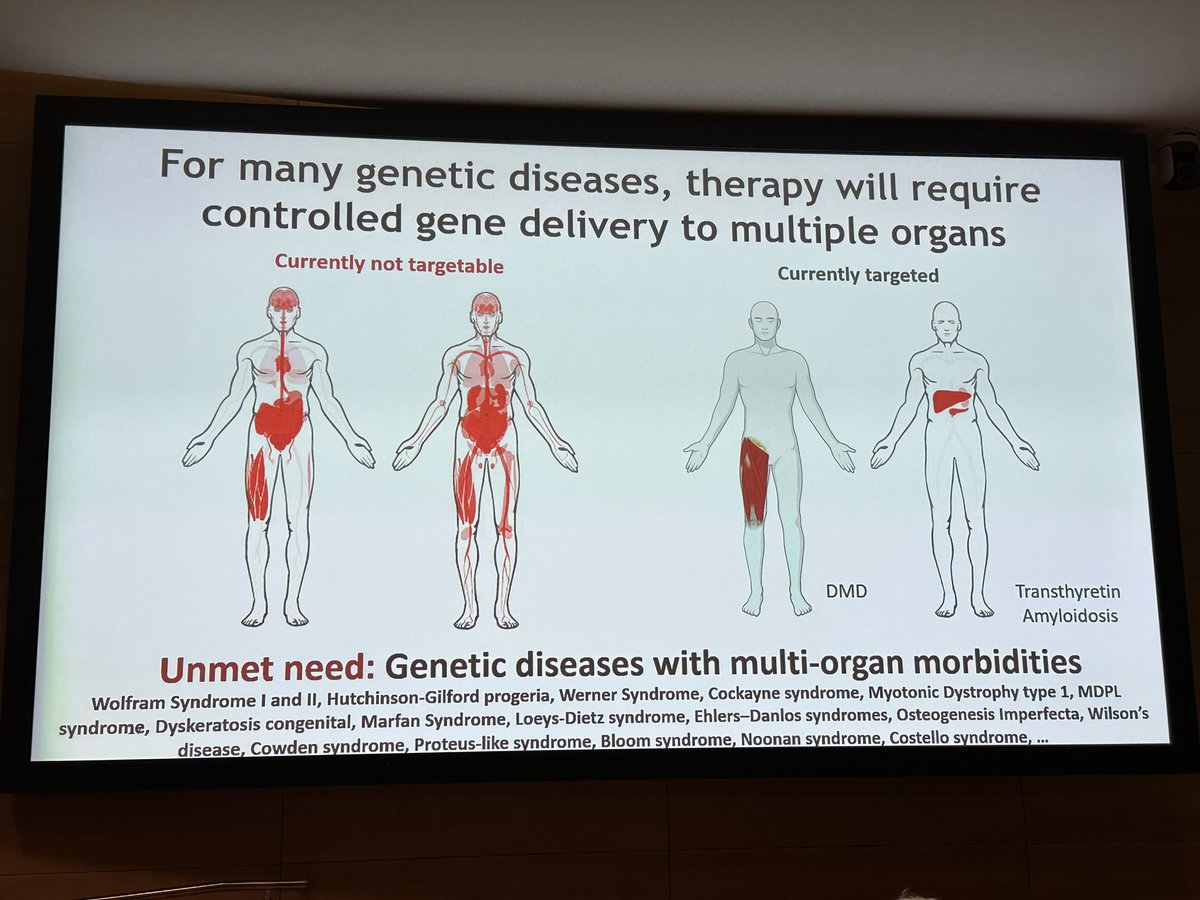
„There are 11 different subtypes of AAVs that can target different cells and tissues and AAV is the most reliable and safe“, but very high doses needed, says @jonirutter presenting @NIH‘s Bespoke Gene Therapy Consortium which aims to optimize AAVs as vectors for gene therapy 

Rachel Haurwitz of @CaribouBio talking about using genome editing to make CAR-T cells an off-the shelf therapy instead of current approach where CAR-T cells are produced specifically for every individual patient #HGESummit 

Interesting detail in talk by Sonja Schrepfer of Sana Biotechnology: Red blood cells don't express MHC molecules (since they don't have nucleus) but they escape being targeted by immune system by overexpressing CD47. As they age they shed CD47 and get cleared by immune system...
That combination of no MHCs and lots of CD47 is Sana's strategy for making allogeneic cells that are not recognised by the host's immune system.
#HGESummit
#HGESummit

"Effective therapies are not reaching patients in need", says Claire Booth. "Despite over 150 clinical trials of gene therapies in rare diseases, we only have a handful of licensed therapies“ #HGESummit 

„Even once they're licenced, there's not a guarantee that they're going to be available to patients or may only be available to patients in certain countries“, says Booth.
„Limited access to gene therapies is increasingly acknowledged as a huge challenge.“
„Limited access to gene therapies is increasingly acknowledged as a huge challenge.“
„There are some obvious barriers. Cost is one of them“, says Booth giving list prices for some of the licenced therapies, for instance for spinal muscular atrophy: 1.8 million pounds, $2.4 million or 1.9 million Euros. 
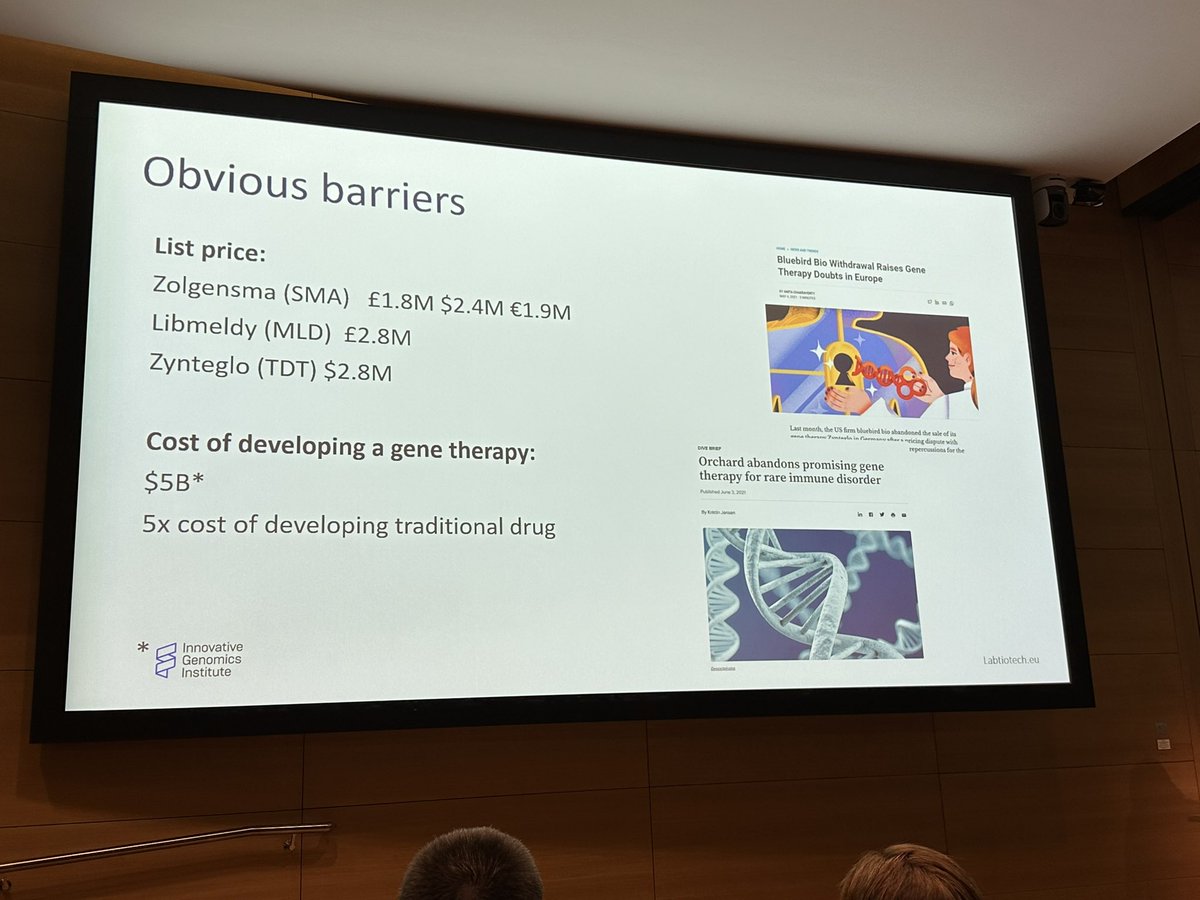
„It really feels like we need to have a rethink“, says Booth, in order „to achieve sustainable and affordable access to life changing gene therapies, and an alternative to the conventional commercialization model“ 
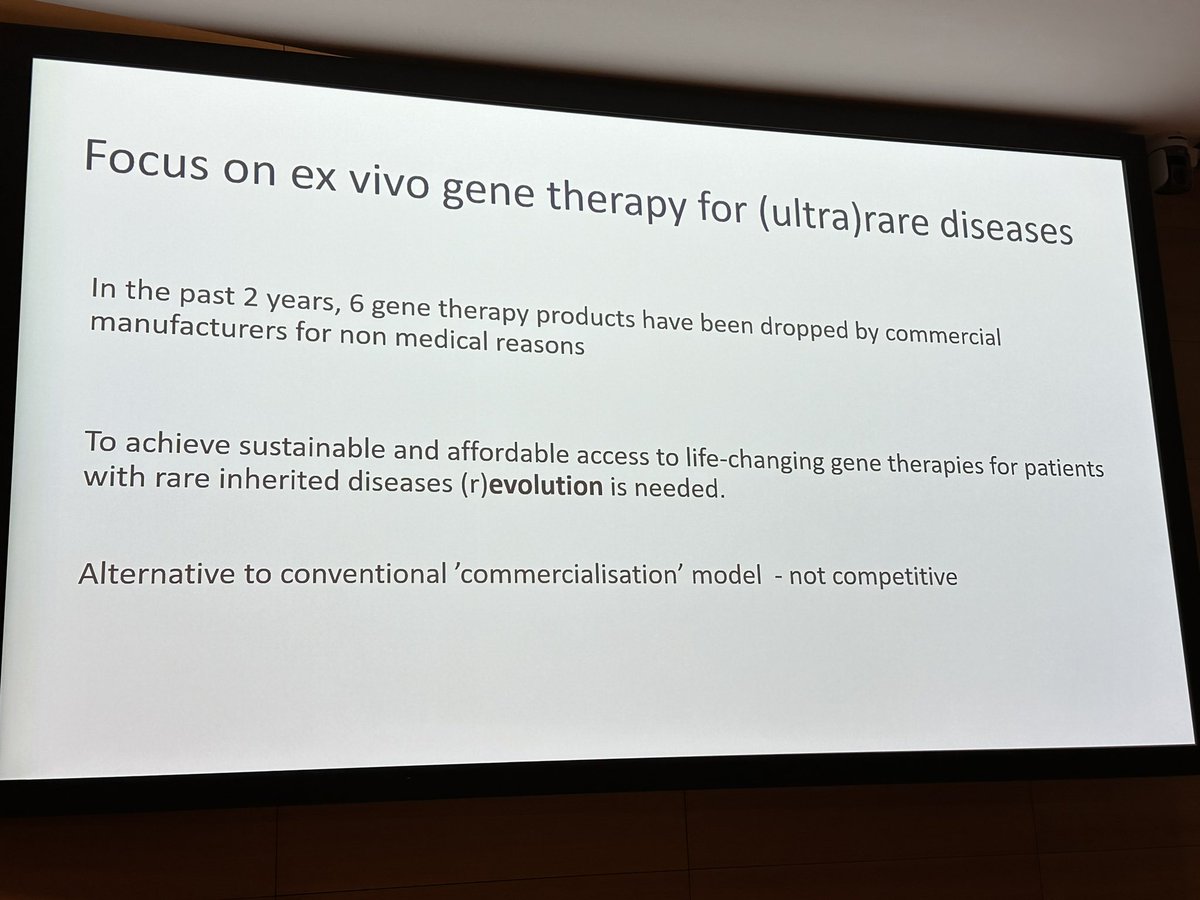
Someone from @gatesfoundation (she jumped in for Mike McCune and I missed her name, sorry) pointing out that people living with HIV and/or sickle cell disease could profit from gene therapy, but limited R&D and problems in affordability and access #HGESummit 





Interesting perspective on how cost-of-goods for gene therapies might be driven down to 1-2k dollars per dose in low and middle income countries: 

"I think we're starting to see glimmers of hope that there may be a path forward for a simplified gene therapy for these diseases of major global health concern", she says. "The technical solutions will not be sufficient."
„When you don't manage pricing, it leads to what you would expect: very high prices. And that's driven by multiple factors but in the US, it’s partly driven by the fact that there's no negotiation“, says Steve Pearson of @icer_review 

Interesting question on value: Cure for haemophilia B would save a lot of money because current treatment is very expensive. But: "blindness doesn't cost the healthcare system a penny", says Pearson. So would a gene therapy for blindness end up not being worth very much? 

„So the thing that we hesitate to talk about but which is extremely real, is the idea that we might have to decide that not everybody gets it at once and this happened with hepatitis C treatments even in the US system“, says Pearson #HGESummit 

„I'm afraid that we're not ready“, says Pearson. „Because I don't know how we're going to be able to create the pricing, the payment and the intellectual property innovation at the speed that the science is bringing these treatments forward. 

„I'm also concerned that these issues all require trade-offs to be discussed maturely and honestly, in societies that may not be ready for it“, says Pearson. #HGEsummit
Time for lunch break, but that was a vital and fascinating discussion on availability and pricing of gene therapies and we should talk about this a lot more!
Fascinating talk by @MackenzieTippi on prenatal somatic cell gene editing. One advantage: The fetal immune system is more tolerant to foreign cells, new proteins and gene therapy vectors… 

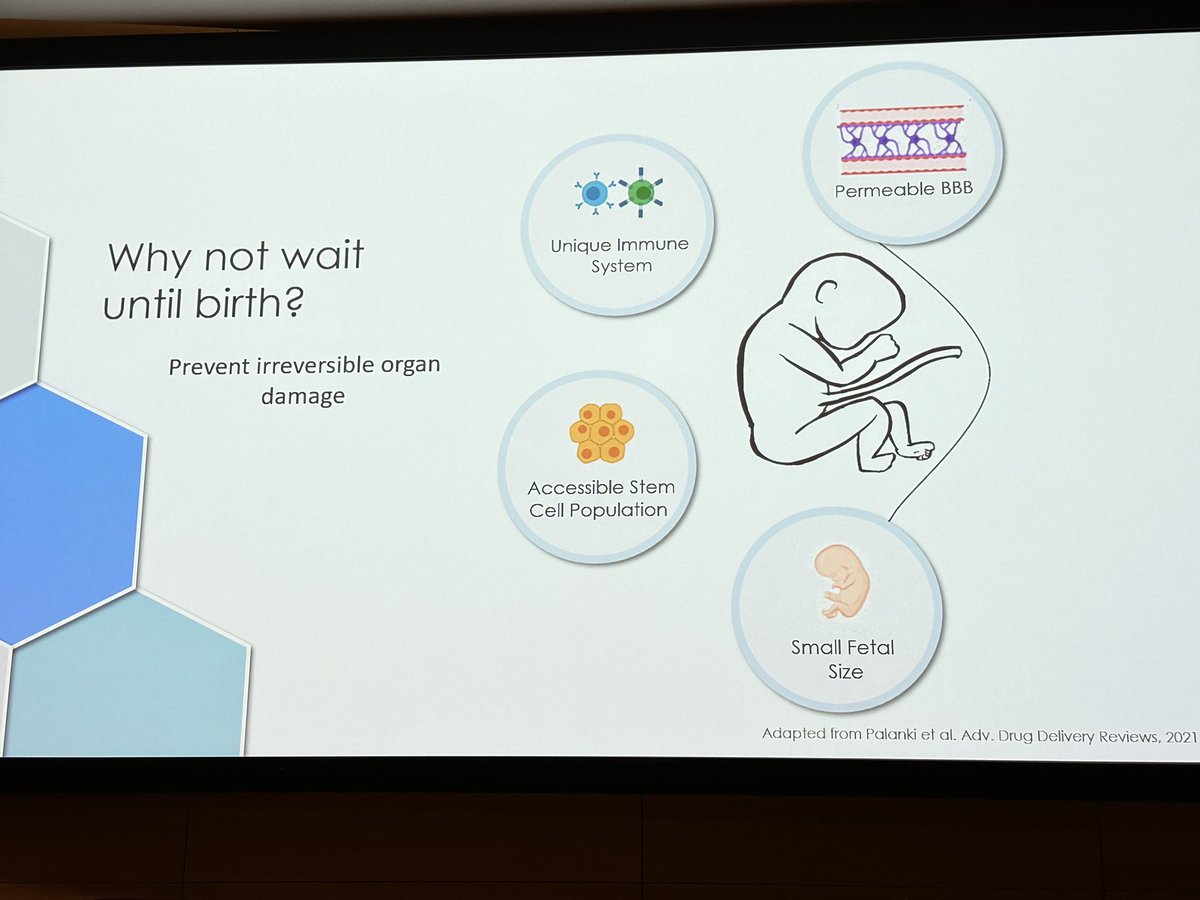

@MackenzieTippi It's not necessary to replace dystrophin 100% to cure Duchenne muscle dystrophy says Eric Olson in his talk, estimates are that recovering 15% of the normal level would be enough...
There are 505 different inborn errors of immunity that are known. „So when will the CRISPR cure be available to all 505 inborn errors of immunity?“, asks @UrnovFyodor „What fraction of the 112,000 individuals with these conditions will get such cures in the next decade?“
„How are we doing with CRISPR cures for all of these? Very poorly“, says @UrnovFyodor. „There are zero clinical trials for CRISPR to treat inborn errors of immunity“ 



• • •
Missing some Tweet in this thread? You can try to
force a refresh

